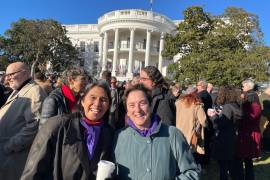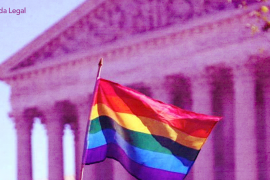
What's Next for Marriage Litigation?
Blog Search
Many of us were surprised when the Supreme Court on October 6 declined to accept any of the seven pending petitions seeking further review of federal appeals court decisions that had struck down laws denying same-sex couples the freedom to marry in Utah, Oklahoma, Indiana, Wisconsin and Virginia. By rejecting those petitions, the decisions became final and same-sex couples in those states are now marrying. Quickly, several states that fall geographically within the same three federal appellate districts (Colorado, North Carolina and West Virginia) followed suit and struck their existing marriage bans, and a federal district judge soon compelled Wyoming to do likewise. The two remaining states in those districts — Kansas and South Carolina — are resisting complying with the federal mandate, and court cases, including one filed by Lambda Legal in South Carolina, are proceeding to secure compliance.
Then, the day after the Supreme Court’s action, the 9th Circuit Court of Appeals struck down discriminatory marriage bans in Nevada and Idaho, and same-sex couples soon were able to marry in those states. Soon thereafter, federal district judges struck down bans in Alaska and Arizona, leaving only Montana as the lone holdout in the 9th Circuit. All told, in less than two weeks, the number of marriage equality states jumped from 19 to 32, along with the District of Columbia, and that number very soon should rise to 35. Additionally, due to a state court ruling that the Missouri Attorney General has chosen not to appeal, Missouri now recognizes same-sex couples’ marriages performed in others states, although it does not currently issue marriage licenses in Missouri.
The question now is what next? What about the other 15 states? A decision has been expected any day out of the 6th Circuit, which is considering appeals in Michigan, Ohio, Tennessee and Kentucky. A win there could move us forward to 39 states.
That leaves what many consider the three most conservative federal appellate courts that have yet to weigh in: the 8th Circuit (North Dakota, South Dakota, Nebraska, Arkansas and Missouri are the states in that Circuit that currently do not permit same-sex couples to marry), the 11th Circuit (Florida, Georgia and Alabama) and the 5th Circuit, where appeals from Texas and Louisiana are currently before the Court and set for argument the week of January 5, 2015 (and perhaps soon to be joined by a case out of Mississippi). Lambda Legal has joined as co-counsel in the appeal of the Louisiana ruling, which had the distinction before last week’s ruling out of Puerto Rico of being the only U.S. District Court since last year’s historic Supreme Court ruling in U.S. v. Windsor to uphold a discriminatory state marriage ban. There currently is marriage litigation working its way through each of the other two appellate districts as well, and Lambda Legal along with co-counsel is representing couples in Georgia and North Dakota.
So what does the Supreme Court’s decision to let stand rulings out of the 4th, 7th and 10th Circuits allowing same-sex couples to marry say about the future of litigation that remains elsewhere? Well, technically, it only means that there weren’t four justices who wanted to hear these cases. We don’t know how they voted or why they decided not to hear any of the cases. While this doesn’t tell us whether any particular justice agreed or disagreed with either the result or the analysis and reasoning the different appellate courts used to reach those decisions, it does change the tone of the arguments that will be held in future courts.
We certainly might infer that the justices did not see anything about these decisions so extreme or clearly wrong that they needed to step in immediately and stop these marriages from occurring. It also seems unlikely the Supreme Court will feel the necessity to take up the issue as long as all of the appellate courts are in agreement. Justice Ginsburg certainly has suggested as much in an interview. That is why many are eagerly awaiting the ruling out of the 6th Circuit, and why the cases coming before the 5th Circuit, including one upholding a marriage ban, are being watched so closely. A circuit split would likely force Supreme Court review.
But the Court could have waited to watch the litigation around the country play out further. Why did the Court dismiss the petitions for review so quickly after having just put all the favorable marriage decisions on hold a few months ago? Some have suggested the Court denied the pending petitions now to send a signal to the remaining appellate courts that the Justices would need to see better justifications for these marriage bans than they have seen so far. Others have conjectured that, having had time to look at the petitions, the Court was moved that forcing same-sex couples to wait inflicted ongoing harm on families who needed the stability and protections marriage might provide to those who needed it most. Indeed, Lambda Legal’s case from Indiana involved an appeals court lifting its stay — a rare situation — to protect a couple, one of whom is battling stage IV ovarian cancer. Who knows?
One thing seems sure. If the Court takes up a marriage decision in the future, it will be doing so in a very different world — where the vast majority of the population now lives in marriage equality states, where many same-sex couples have married and are raising families, and where public opinion has shifted more dramatically than one could have imagined just a few years ago. In the meantime, we savor the victories!




